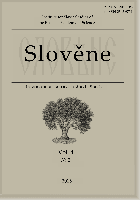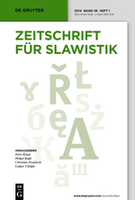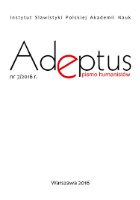
Slavia-Casopis pro Slovanskou Filologii
Scope & Guideline
Bridging Tradition and Modernity in Slavic Studies
Introduction
Aims and Scopes
- Slavic Linguistics:
The journal emphasizes the study of Slavic languages, including their historical development, dialectology, and comparative linguistics. This includes etymological studies and analyses of language structures across Slavic languages. - Cultural and Literary Studies:
There is a strong focus on Slavic literature, including critical analyses of literary works, authorship, and the cultural contexts that shape literary expression. Themes often explore the intersection of literature with history and society. - Historical Analysis:
The journal publishes works that examine historical texts and contexts, particularly how Slavic culture and languages evolved over time. This includes studies on historical linguistics and the socio-political factors influencing language use. - Interdisciplinary Approaches:
Many papers take an interdisciplinary approach, merging linguistics, literature, cultural studies, and history, reflecting the journal's commitment to a holistic view of Slavic studies. - Mythology and Folklore:
Research on Slavic mythology and folklore is prominent, contributing to a deeper understanding of cultural identity and heritage within Slavic communities. - Digital Humanities:
The incorporation of digital tools and methodologies in Slavic studies is becoming increasingly relevant, indicating the journal's openness to modern research techniques and platforms.
Trending and Emerging
- Interdisciplinary Research:
There is a growing trend towards interdisciplinary research that combines linguistics, literature, sociology, and cultural studies, indicating a broader approach to understanding Slavic identities and experiences. - Gender Studies and Feminism:
Emerging themes related to gender studies and feminist critiques in Slavic literature and society are gaining traction, reflecting a significant shift towards exploring gender dynamics within Slavic contexts. - Postcolonial and Diaspora Studies:
Research focusing on postcolonial perspectives and the experiences of Slavic diasporas is becoming more prevalent, suggesting an increased interest in the global implications of Slavic studies. - Cultural Memory and Trauma Studies:
The exploration of cultural memory, particularly related to trauma and historical experiences (such as war and collectivization), is a rising theme, reflecting contemporary societal concerns and the need to address historical narratives. - Digital Humanities Applications:
The application of digital humanities in Slavic studies is increasingly prominent, highlighting a trend towards using digital tools for analysis, preservation, and broader dissemination of Slavic cultural heritage.
Declining or Waning
- Traditional Dialect Studies:
There has been a noticeable decline in papers focused specifically on traditional dialects of Slavic languages, possibly as researchers shift towards broader sociolinguistic or digital methodologies. - Historical Sociolinguistics:
Research that heavily emphasizes historical sociolinguistics has decreased, suggesting a trend towards more contemporary linguistic studies or applied linguistics that engage with current societal issues. - Narrowly Defined Literary Criticism:
The journal seems to be moving away from narrowly defined literary criticism, which may indicate a shift towards more interdisciplinary and thematic studies that integrate various aspects of Slavic culture.
Similar Journals

Studia Litterarum
Exploring the Depths of Literary and Cultural NarrativesStudia Litterarum, published by the esteemed Russian Academy of Sciences at the A.M. Gorky Institute of World Literature, serves as a vital platform for the exploration and analysis of literature and cultural studies. With an ISSN of 2500-4247 and an E-ISSN of 2541-8564, this open access journal has been disseminating valuable research since 2016, reaching a global audience keen on advancing the understanding of literary theory and cultural narratives. Based in Moscow, Russia, the journal has achieved remarkable academic recognition, holding a Q2 classification in Cultural Studies and a prestigious Q1 tier in Literature and Literary Theory, as of 2023. Its Scopus rankings underscore its relevance, with a notable placement in the 51st percentile for literature and literary theory and 27th percentile for cultural studies. Studia Litterarum not only opens doors to scholarly dialogue but also enhances the visibility of contemporary literary scholarship, making it an essential read for researchers, professionals, and students alike seeking to deepen their understanding of the intricate dynamics within literature and cultural studies.

Konstantinove Listy-Constantines Letters
Advancing interdisciplinary dialogue in history, philosophy, and religion.Konstantinove Listy - Constantines Letters is a premier academic journal published by the Constantine Philosopher University in Nitra, Slovakia. With a focus on the interdisciplinary exploration of historical, philosophical, and religious studies, this journal has established itself as a significant platform for scholarly discourse since its inception in 2015. The journal's impressive rankings—Q1 in History and Religious Studies, along with Q2 in Philosophy—demonstrate its commitment to high-quality research, concurrent with its strong performance in Scopus rankings, placing it in the 80th percentile for both Religious Studies and History disciplines. As an integral part of the academic landscape, Konstantinove Listy invites researchers, professionals, and students alike to contribute to its mission of advancing knowledge and understanding in these vital fields. While the journal operates under traditional publishing, it is recognized for its accessibility and contribution to fostering a vibrant scholarly community.

Slovene-International Journal of Slavic Studies
Fostering Global Dialogue on Slavic CulturesThe Slovene-International Journal of Slavic Studies, published by the Russian Academy of Sciences, Institute of Slavic Studies, serves as a vital platform for scholarly discourse in the fields of Cultural Studies, History, Linguistics, and Religious Studies. Since its transition to Open Access in 2012, the journal has enriched academic dialogue, enabling wider circulation and accessibility of research findings. Based in the Russian Federation, the journal supports interdisciplinary approaches, inviting contributions that push the boundaries of traditional Slavic studies. With a commendable ranking in the Q3 quartile across multiple categories as of 2023 and respectable Scopus rankings, it stands out as a crucial resource for researchers and students alike, enhancing their understanding of Slavic and related cultural contexts. The journal's commitment to fostering international collaboration and dialogue positions it as an invaluable asset for anyone engaged in the complexities of Slavic studies.

Journal of Slavic Linguistics
Exploring the Depths of Slavic LinguisticsJournal of Slavic Linguistics, published by SLAVICA PUBLISHERS, is a key academic resource dedicated to the exploration of Slavic languages and linguistics. Established to provide a comprehensive platform for scholarly research, this journal addresses the intricate dynamics of Slavic phonetics, syntax, semantics, and discourse, making significant contributions to both theoretical and applied linguistics. The journal holds an impact factor that reflects its value in the linguistic community, particularly as it is ranked in the Q4 category in Linguistics and Language for 2023. With a focus on a wide range of topics within the field, the Journal of Slavic Linguistics serves as an essential reference for researchers, educators, and students alike, fostering an appreciation and deeper understanding of Slavic linguistic phenomena. Although currently not an Open Access journal, it remains accessible to a broad audience keen on engaging with contemporary linguistic scholarship.

Dicenda-Cuadernos de Filologia Hispanica
Cultivating a Vibrant Community of Philological InquiryDicenda-Cuadernos de Filologia Hispanica, published by UNIV COMPLUTENSE MADRID, SERVICIO PUBLICACIONES, is a distinguished academic journal in the fields of linguistics, literature, and literary theory. Since its transition to Open Access in 2017, it has facilitated unrestricted dissemination of knowledge, making it an invaluable resource for researchers, scholars, and students interested in the rich tapestry of Hispanic philology. With an impact factor reflected by its Scopus rankings—at Q3 in Linguistics and Language and Q2 in Literature and Literary Theory—Dicenda serves as a vital platform for innovative research and critical discourse. The journal actively encourages submissions that explore contemporary and historical perspectives within its scope. Located in Madrid, Spain, the journal has steadily established itself as a significant contributor to the ongoing dialogue in the humanities, fostering a deeper understanding of linguistic and literary phenomena.

Vestnik Slavianskikh Kultur-Bulletin of Slavic Cultures-Scientific and Informational Journal
Connecting Researchers to the Heart of Slavic CultureVestnik Slavianskikh Kultur-Bulletin of Slavic Cultures is a distinguished scientific and informational journal published by the State Academy of Slavic Culture. This journal, with ISSN 2073-9567, plays a pivotal role in the field of Slavic studies, providing a platform for the dissemination of cutting-edge research, cultural discourse, and scholarly analysis pertaining to Slavic cultures and civilizations. The journal aims to foster a deeper understanding of Slavic heritage, literature, and the societal dynamics shaping these cultures today. Although currently lacking an open access model, it remains an important resource for researchers, professionals, and students interested in the rich tapestry of Slavic traditions and contemporary cultural phenomena. With its thoughtful curation of articles, Vestnik Slavianskikh Kultur is poised to contribute significantly to ongoing scholarly conversations within the humanities.

SLAVIC AND EAST EUROPEAN JOURNAL
Charting New Territories in Slavic and East European ResearchThe Slavic and East European Journal (ISSN: 0037-6752) is a distinguished publication focused on the rich tapestry of Slavic and Eastern European cultures, languages, and literatures. Published by the Ohio State University’s Department of Slavic and East European Languages & Culture, this journal serves as a vital platform for scholars and researchers keen on exploring linguistic diversity and cultural heritage in these regions. With a wide-ranging scope, the journal addresses significant topics within Cultural Studies, Linguistics, and Literature, currently categorized in Q4 and Q3 quartiles across various academic metrics. Although it does not offer open access, anticipation is high among academics seeking to contribute or access cutting-edge research that pushes the boundaries of understanding these complex fields. As it converges from 2009 to 2024, the Slavic and East European Journal continues to uphold its commitment to academic excellence and community engagement, making it an essential resource for anyone dedicated to the study of Slavic and Eastern European traditions.

ZEITSCHRIFT FUR SLAWISTIK
Unveiling the Rich Tapestry of Slavic Linguistics and LiteratureZEITSCHRIFT FUR SLAWISTIK, published by WALTER DE GRUYTER GMBH, is a renowned journal focusing on Slavic studies, encompassing various fields such as cultural studies, linguistics, and literary theory. With its ISSN 0044-3506, this distinguished journal has been a significant contribution to the academic community since its inception in 1956, continuing to disseminate valuable research until 2024. While maintaining a strong reputation within several academic categories, ZEITSCHRIFT FUR SLAWISTIK holds a Q3 ranking in Cultural Studies and Linguistics and Language, and a Q2 ranking in Literature and Literary Theory as of 2023. This positioning underscores the journal’s impact, particularly as it caters to an audience of researchers, professionals, and students invested in the rich tapestry of Slavic culture and language. Access to this journal is not open; however, its comprehensive articles are crucial for anyone aiming to explore and deepen their understanding of Slavic linguistic and literary traditions. The journal's work is essential in fostering cross-disciplinary dialogue and advancing scholarship in these vital areas.

Adeptus
Bridging Disciplines in the Heart of Slavic CultureAdeptus is a pioneering open-access journal published by the Polish Academy of Sciences, Institute of Slavic Studies, specializing in Slavic studies and cultural research. Since its inception in 2014, the journal has aimed to foster scholarly dialogue and advance knowledge across various disciplines related to Slavic languages, literature, history, and sociology. With an ISSN of 2300-0783, Adeptus has positioned itself as a vital resource for researchers, professionals, and students engaged in Slavic studies, offering a platform for high-quality, peer-reviewed articles that explore diverse topics within the field. The journal's open-access model promotes accessibility and dissemination of knowledge, making it a significant contributor to the academic landscape. Located in Warsaw, Poland, Adeptus continues to thrive as a key outlet for innovative research, inviting submissions that embody rigorous scholarship and insightful perspectives.

Jezikoslovlje
Unveiling the Dynamics of Language and SocietyJezikoslovlje, published by the Josip Juraj Strossmayer University, Faculty of Philosophy in Croatia, is an essential publication in the field of Linguistics and Language Studies. Launched in 2008 and extending its contributions to the academic community through 2024, this journal addresses a spectrum of linguistic research, facilitating scholarly dialogue around both theoretical and applied aspects of language. With a current Scopus ranking placing it in the 54th percentile in the Arts and Humanities and the 50th percentile in Social Sciences, Jezikoslovlje serves as a vital resource for researchers and students looking to engage with contemporary linguistic issues. Although it operates under a traditional access model, its indexed presence and rigorous peer-review process ensure that published works maintain a high scholarly standard, inviting contributions that advance understanding in this dynamic discipline. The journal's commitment to fostering knowledge in linguistics makes it a significant platform for academics in Croatia and beyond.